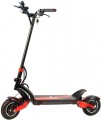Max. load
The maximum weight of the rider that the design of the scooter can withstand without breakdowns and accidents. This moment is partly determined by the age group, and mainly by the materials used in the frame. Note that manufacturers can indicate the maximum load for perfect conditions - when the scooter rides on a perfectly flat surface or even stands still. Therefore, it is worth choosing a model for this parameter with a certain margin. And even more so, you should not exceed the weight indicated in the characteristics - even if the scooter does not break down immediately, this can happen at any time after, which is fraught with accidents and injuries.
Range
The maximum distance that an electric scooter can travel on a single battery charge.
Usually the range is indicated for a flat road and driving only on an electric motor, without the help of a rider. So this indicator is quite conditional, in practice, the distance of the trip may be either less or more, depending on the characteristics of the road and driving style. Nevertheless, according to the claimed range, it is quite possible to estimate the autonomy of different models and compare them with each other.
Note that a
large range (more than 50 km) requires capacious batteries, which affects the dimensions and weight of the device. The real need for such autonomy is not required so often, especially since many electric scooters are quite capable of driving in the usual way, without the use of an electric motor.
Power
The power of the motor installed in the electric scooter. In models with two motors (one per wheel), their total power is usually indicated.
A more
powerful motor, on the one hand, has a positive effect on the speed and acceleration characteristics; on the other hand, it affects the cost of the device and requires more capacious batteries, which affect both the price and weight. In addition, at acceleration and low speeds, the scooter can be “helped” by pushing off with your foot. Therefore, in most modern models, the motor power is low — most often in range of 250 W,
300 W,
350 W. Power of 500 W is considered quite high, it allows you to reach speeds of 40 km/h and even higher. In the most advanced models, power is already measured in kilowatts, and the maximum speed can exceed 80 km/h; however, such "monsters" cost accordingly.
However, power also affects the ability to drive a vehicle, because depending on the country, various traffic rules are provided for driving a scooter.
Max. speed
A high top speed gives you more riding options and reduces travel time. However, it requires powerful motors and capacious batteries, which affects the price and weight of the scooter. In addition, the faster the scooter, the more careful you need to be when driving. Therefore, most of the electric scooters have a speed of
25 km / h or a little more -
30 km / h.
Speed modes
The number of speed modes in the electric scooter. By switching between them, the rider has the right to choose the most comfortable pace of the trip and change the upper speed limit bar.
Max. climbing angle
The maximum climbing angle that an electric scooter can overcome on engine power alone, without the help of legs. Models with engines of the same power may differ in this indicator (due to the difference in torque and wheel size).
Note that in the specifications the angle is usually indicated in degrees, while on road signs it is given as a percentage (1% corresponds to a rise of 1 m for every 100 m of horizontal movement). However, this moment is not particularly critical: if you often have to overcome a certain hill, you can clarify its slope by converting percentages into degrees (and vice versa) according to special tables. In addition, if the angle turns out to be too large, nothing prevents you from helping the scooter with your foot, in extreme cases, to overcome the climb on foot.
Regenerative
Possibility of electric scooter operation in recuperation mode. In this mode, the direction of the current starts “in the opposite direction”: the electric motors in the wheels work like generators, generating electricity and recharging the battery. In this case, the speed must be maintained either due to repulsion from the ground, or due to coasting from a hill. Properly using recuperation, you can significantly increase the power reserve: for example, it is good to turn on this mode on long descents or on long, flat sections of the road where it is easy to drive in the usual way, without using electric motors.
Battery capacity
Battery capacity installed in the electric scooter.
Theoretically, a higher battery capacity allows for a longer range, but in fact, not everything is so clear. Firstly, motors of even the same power can differ in efficiency; secondly, the actual amount of energy stored in the battery depends not only on the capacity in amp-hours but also on the voltage in volts. So this parameter is secondary, and when choosing, it is worth focusing not so much on the battery capacity, but on the directly claimed range. You can compare capacity only for models with similar characteristics and the same supply voltage.
Full charge time
Time to fully charge the battery from zero to 100%.
The more powerful the device, the more capacious batteries it needs and, as a rule, the longer the charging time. In the heaviest models, it can reach 20 hours. However, such indicators are rare - most electric scooters are charged for a maximum of 8-9 hours, which allows you to put the device on charge “from evening to morning”.

